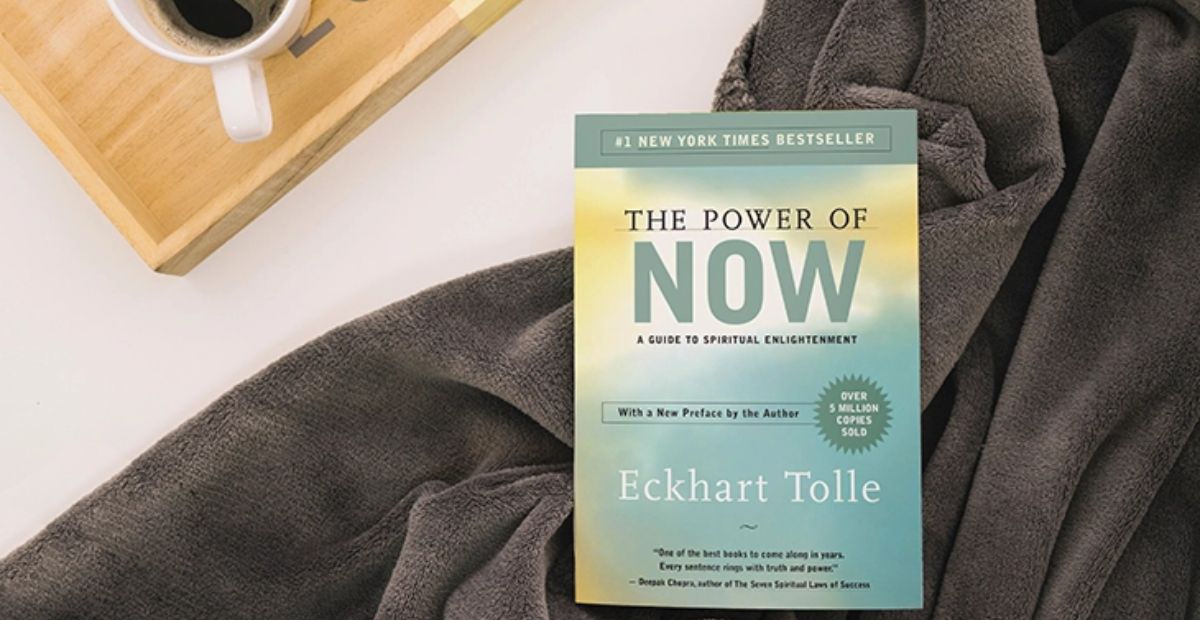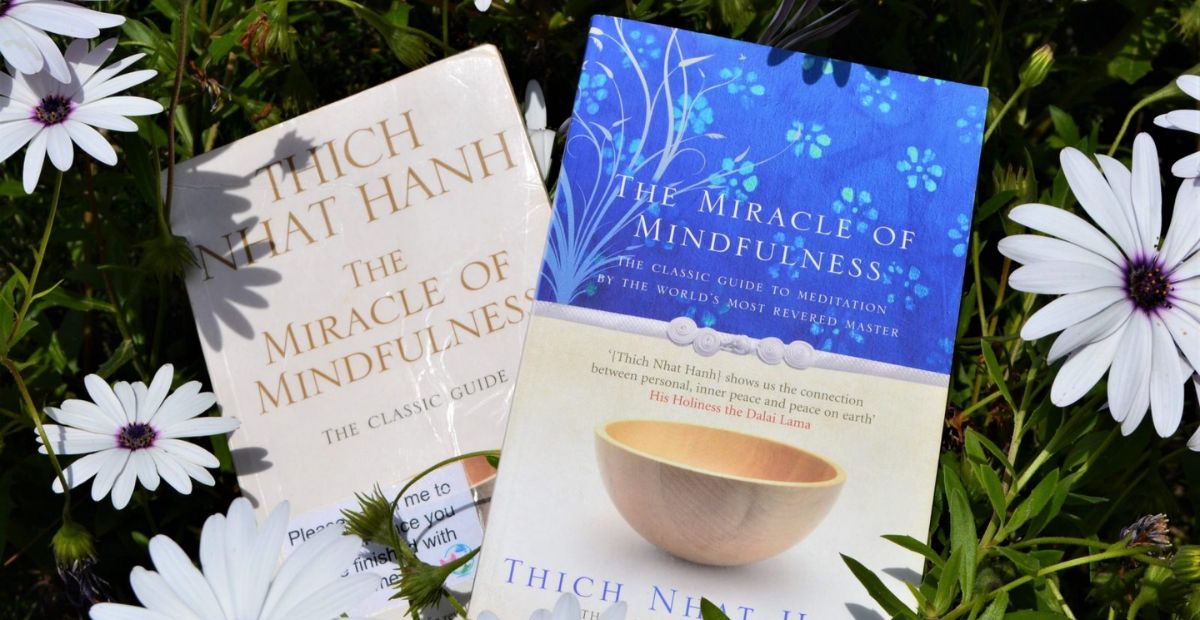In today’s fast-paced world, finding inner peace and mental clarity can seem like an elusive goal. One way to achieve mindfulness and tranquility is through meditation, a practice proven to provide countless benefits for our overall well-being.
But with so many resources available, how do you know which books offer the best guidance? In this blog post, we’ve carefully selected the top 5 best meditation books guaranteed to aid you on your journey towards mindfulness and inner peace.
So sit back, relax, and allow us to help you navigate through the vast ocean of knowledge that awaits your discovery in these transformative reads.
Table of Contents
Top 5 Best Meditation Books For Mindfulness And Inner Peace
These five meditation books have been carefully selected for their ability to help readers achieve mindfulness and inner peace:
“The Power of Now” by Eckhart Tolle, “Mindfulness in Plain English” by Bhante Gunaratana, “10% Happier” by Dan Harris, “The Miracle of Mindfulness” by Thich Nhat Hanh, and “The Headspace Guide to Meditation and Mindfulness” by Andy Puddicombe.
1. “The Power Of Now” By Eckhart Tolle

It is a bestselling spiritual guide written by renowned spiritual teacher Eckhart Tolle.
- Introduces the concept of living fully in the present moment, avoiding distractions from past or future worries.
- Emphasizes the importance of self-awareness and mindfulness to achieve inner peace and happiness.
- Offers practical exercises and techniques for applying the principles in daily life, helping readers overcome negative thought patterns.
- Appeals to both spiritual seekers and those looking for ways to improve their mental well-being.
- Highly praised for its clear, concise language and transformative impact on readers’ lives.
2. “Mindfulness In Plain English” By Bhante Gunaratana
Among the best meditation books available, “Mindfulness in Plain English” by Bhante Gunaratana stands out for its simple, clear, and direct approach to teaching mindfulness meditation.
Written by a highly respected Buddhist scholar and monk, the book offers practical advice and insights into developing a consistent mindfulness practice, making it an ideal choice for beginners or seasoned practitioners alike.
One of the most appealing aspects of “Mindfulness in Plain English” is its straightforward language that cuts through any jargon or complex concepts commonly associated with meditation.
By providing step-by-step guidance on sitting postures, breath awareness, and dealing with distractions during practice, Bhante Gunaratana makes mindfulness accessible to everyone.
Moreover, his emphasis on key principles such as compassion and loving-kindness helps readers incorporate these values into their everyday lives alongside their meditation journey.
To further illustrate his teachings on mindfulness practice, Bhante Gunaratana shares relatable anecdotes from both his own life experiences as well as those of his students.
These stories not only serve as inspiring examples but also allow readers to learn from common obstacles faced by others when it comes to adopting a regular meditation routine.
Overall, if you are looking for one of the best meditation books that demystify this ancient practice in an easy-to-understand manner without compromising depth or wisdom – “Mindfulness in Plain English” is definitely worth your time.
3. “10% Happier” By Dan Harris

“10% Happier” by Dan Harris is a must-read for anyone interested in meditation and mindfulness. This book is a personal account of the author’s journey from being an anxious workaholic to finding inner peace through meditation.
Here are some key points about this book:
- Provides a relatable and humorous perspective on meditation
- Offers practical advice on starting and maintaining a regular meditation practice
- Discusses the science behind meditation and its benefits
- Shares insights from leading figures in the world of mindfulness, including Eckhart Tolle and Joseph Goldstein
Overall, “10% Happier” is an engaging and informative read that appeals to both beginners and experienced meditators alike. It encourages readers to approach meditation with an open mind and shows how it can lead to greater clarity, calmness, and happiness in daily life.
4. “The Miracle Of Mindfulness” By Thich Nhat Hanh

“The Miracle of Mindfulness” is a classic meditation book that teaches readers how to appreciate the beauty and joy in every moment. Thich Nhat Hanh, a Vietnamese Zen master, reveals his personal experiences and provides practical exercises for cultivating mindfulness.
He encourages readers to pay attention to their breathing, thoughts, emotions, and surroundings with non-judgmental awareness.
One notable aspect of this book is its simplicity – it doesn’t require any prior knowledge or experience with meditation. The author’s gentle tone makes the practice feel accessible and relatable.
By focusing on mundane activities like washing dishes or walking, “The Miracle of Mindfulness” shows readers that they can find peace even in the midst of chaos.
Overall, this book offers valuable insights for anyone looking to incorporate more mindfulness into their daily lives. Its teachings are timeless and universally applicable, making it an excellent resource for those seeking inner calm and clarity amidst life’s challenges.
5. “The Headspace Guide To Meditation And Mindfulness” By Andy Puddicombe
“The Headspace Guide to Meditation and Mindfulness” by Andy Puddicombe is a must-read for anyone interested in cultivating mindfulness and inner peace.
Here are some reasons why:
- The book provides a step-by-step guide to meditation, making it easy for beginners to get started.
- It offers practical techniques for dealing with anxiety, stress, and other mental health issues.
- Puddicombe’s personal experience as a monk and meditation teacher lends credibility to the advice he provides in the book.
- The author emphasizes the importance of consistency in meditation practice, offering tips on how to establish a daily routine.
- Puddicombe also explores the science behind meditation, making it accessible to readers who want to understand the benefits of mindfulness on a deeper level.
Benefits Of Reading Meditation Books
Reading meditation books can help improve mental health and well-being, reduce stress and anxiety, develop a regular meditation practice, learn mindfulness techniques, and enhance spiritual growth.
1. Developing A Regular Meditation Practice
Developing a regular meditation practice can be challenging, but it is also one of the most rewarding things you can do for your mental health and well-being. Meditation allows you to quiet your mind, find inner peace, and reduce stress and anxiety.
By setting aside even just a few minutes each day to meditate, you can begin to see significant improvements in your overall sense of calmness and clarity.
When starting out with meditation, it’s important to start small and work up gradually. Just 5 minutes of focused breathing or mindfulness practice each day can have a big impact on your life.
As you become more comfortable with the process, you may choose to increase the amount of time spent meditating or experimenting with different techniques. Remember that there is no right or wrong way to meditate – as long as it feels comfortable and beneficial for you personally!
2. Learning Mindfulness Techniques

Reading meditation books can help you learn various mindfulness techniques that are beneficial for your mental health and well-being. These techniques include observing your thoughts, focusing on your breath, and being present in the moment.
The books listed above provide detailed explanations and practical exercises to help you develop these important skills.
For example, “Mindfulness in Plain English” by Bhante Gunaratana offers a step-by-step guide to developing mindfulness through meditation. It provides tips on how to observe thoughts without judgment and how to focus on the sensations of breathing.
Similarly, “The Headspace Guide to Meditation and Mindfulness” by Andy Puddicombe contains easy-to-follow exercises to help you become more mindful throughout the day.
By learning these mindfulness techniques from expert authors, you will be able to cultivate greater self-awareness and reduce stress levels. With regular practice, these skills can improve your ability to cope with challenging situations and enhance your overall quality of life.
3. Improving Mental Health And Well-being
Reading meditation books can greatly improve your mental health and well-being. These books offer practical techniques for coping with anxiety, depression, and stress.
They also explain the science behind meditation and how it positively impacts our brain chemistry.
For instance, “The Power of Now” by Eckhart Tolle helps readers recognize negative self-talk and become more present in their everyday lives. This leads to a reduction in stress levels and an increase in feelings of calmness.
Similarly, “10% Happier” by Dan Harris shares his personal journey with anxiety and how he found relief through mindfulness meditation. By reading this book, you will learn strategies for dealing with difficult emotions as well as techniques for cultivating joy and gratitude.
Overall, incorporating meditation into your daily routine can have a transformative effect on your life. When you combine regular practice with insights from these top-rated books, you are sure to experience positive changes in both your physical health and emotional outlook.
4. Reducing Stress And Anxiety

Reading meditation books can be an effective way to reduce stress and anxiety. Many of the top meditation books provide practical techniques to develop mindfulness, which can help individuals manage their thoughts and emotions more effectively.
For example, “The Power of Now” by Eckhart Tolle teaches readers how to stay present at the moment and avoid getting caught up in worries about the future or regrets from the past.
By focusing on what is happening right now, readers may find that they feel less stressed and more grounded. In addition, some meditation books offer specific exercises or meditations to help calm the mind and reduce anxiety.
“10% Happier” by Dan Harris chronicles his journey as a news anchor who struggled with panic attacks before finding relief through mindfulness practice.
The book includes practical advice on how to begin meditating for anyone who is new to it as well as tips for dealing with anxious thoughts during meditation sessions. Incorporating these techniques into your daily routine could lead to significant reductions in stress levels over time.
5. Enhancing Spiritual Growth
One of the most significant benefits of reading meditation books is enhancing spiritual growth. Meditation helps to connect you with your inner self and expand your consciousness, leading to a more profound understanding of life’s meaning and purpose.
Through regular practice, meditation can help you tap into your intuition and access higher states of consciousness.
Reading meditation books can guide you in developing mindful awareness, compassion, and kindness towards yourself and others, which are important for spiritual growth.
It also provides insights into different mindfulness practices such as mantra chanting or breathwork that are helpful in deepening one’s connection with their higher-self.
For example, “The Power of Now” by Eckhart Tolle teaches readers about being present at the moment and cultivating inner peace through mindfulness techniques.
By following his teachings on achieving stillness within oneself, readers report feeling more connected with their spirituality and experiencing a greater sense of purpose in life.
Therefore, if spiritual development is something you’re seeking through mediation practice then reading relevant books can be a helpful tool in achieving this goal.
How To Choose The Right Meditation Book
To choose the right meditation book, start by identifying your goals and interests, checking the author’s credentials, considering the style and approach of the book, and reading reviews and recommendations.
● Identifying Your Goals And Interests
When selecting the best meditation book for yourself, it’s crucial to first identify your goals and interests.
Do you want to learn mindfulness techniques?
Are you looking to reduce stress and anxiety?
Or are you more interested in enhancing your spiritual growth?
The answers will help narrow down the options available.
For instance, if your goal is to develop a regular meditation practice, books like “Mindfulness in Plain English” by Bhante Gunaratana or “The Headspace Guide to Meditation and Mindfulness” by Andy Puddicombe might be more suitable.
On the other hand, if you’re seeking mental health benefits, “10% Happier” by Dan Harris could be an excellent choice.
It’s also worth considering personal preferences – are you drawn towards scientific-based explanations or spirituality-focused texts? Taking into account these factors will ultimately lead to a selection of a meditation book that aligns with both your interests and goals.
● Checking The Author’s Credentials
When selecting a meditation book, it’s important to check the author’s credentials. You want to make sure you’re learning from someone who is experienced and knowledgeable in this field.
Look for authors who have spent years practicing and teaching meditation, or those with relevant qualifications such as psychology or neuroscience degrees.
For example, Thich Nhat Hanh, author of “The Miracle of Mindfulness,” has been a Buddhist monk for over 70 years and is considered one of the world’s leading spiritual teachers.
Similarly, Eckhart Tolle, author of “The Power of Now,” has studied and practiced spirituality for many years and has become a renowned teacher of mindfulness practices.
Be cautious when selecting books written by self-proclaimed experts without any credible qualifications or experience in the field. Remember to do your research before diving into any meditation practice suggested by an unfamiliar author.
● Considering The Style And Approach Of The Book
When choosing the right meditation book, it’s important to consider the style and approach of the author. Some authors may focus on a specific type of meditation practice or philosophy, while others might incorporate various techniques and beliefs.
Take some time to research different authors and their writing styles to find one that resonates with you. For example, Eckhart Tolle’s “The Power of Now” is known for its straightforward language and emphasis on present-moment awareness.
On the other hand, Thich Nhat Hanh’s “The Miracle of Mindfulness” uses poetic descriptions and personal anecdotes to convey his teachings. Finding an author whose style speaks to you can make all the difference in how well you connect with their message.
It’s also worth considering what kind of approach works best for your learning style.
Do you prefer step-by-step instructions or more abstract concepts?
Are you looking for a practical guide or a spiritual exploration?
Understanding your preferences will help narrow down your options and ultimately lead you to choose a book that suits your needs best.
● Reading Reviews And Recommendations
When choosing a meditation book, it’s important to read reviews and recommendations from other readers. This can help you get an idea of whether the book is right for you or not.
Look out for reviews on popular bookselling sites like Amazon or Goodreads, as well as blogs and forums dedicated to mindfulness and meditation.
Keep in mind that everyone’s preferences are different, so don’t let one negative review discourage you from picking up a book that intrigues you. However, if there are consistent issues being raised across multiple reviews, it may be worth considering before making your purchase.
On the flip side, glowing reviews can give you confidence that a book will meet your needs and expectations.
Conclusion
Incorporating meditation into your daily routine can be a life-changing practice that provides numerous benefits for your mind, body, and soul.
By reading the best meditation books available in the market today, you can effectively learn various mindfulness techniques and improve your overall well-being.
Remember to choose a book that suits your goals and interests while considering the author’s credentials, style, and approach as well as other reader reviews before making a purchase.
With these valuable resources at hand, you’ll be well on your way to discovering inner peace and harmony in no time.
Related Post:







